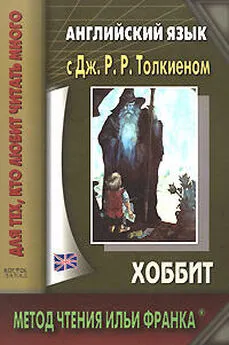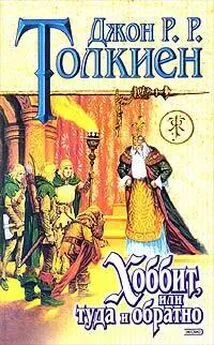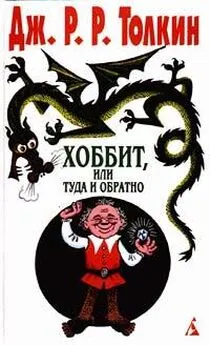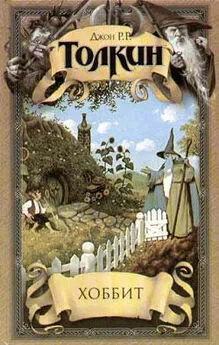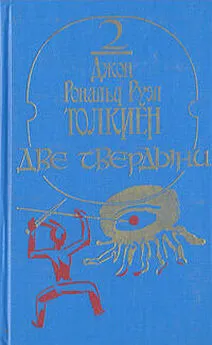Джон Толкиен - Английский язык с Дж. Р. Р. Толкиеном. Хоббит
- Название:Английский язык с Дж. Р. Р. Толкиеном. Хоббит
- Автор:
- Жанр:
- Издательство:АСТ, Восток-Запад
- Год:2008
- Город:Москва
- ISBN:978-5-17-048593-2, 978-5-478-00597-9
- Рейтинг:
- Избранное:Добавить в избранное
-
Отзывы:
-
Ваша оценка:
Джон Толкиен - Английский язык с Дж. Р. Р. Толкиеном. Хоббит краткое содержание
В книге предлагается произведение на английском языке Джона Р. Р. Толкиена «Хоббит», адаптированное (без упрощения текста оригинала) по методу Ильи Франка. Уникальность метода заключается в том, что запоминание слов и выражений происходит за счет их повторяемости, без заучивания и необходимости использовать словарь.
Пособие способствует эффективному освоению языка, может служить дополнением к учебной программе.
Предназначено для студентов, для изучающих английский язык самостоятельно, а также для всех интересующихся английской культурой.
Пособие подготовила Ольга Ламонова.
Английский язык с Дж. Р. Р. Толкиеном. Хоббит - читать онлайн бесплатно полную версию (весь текст целиком)
Интервал:
Закладка:
“I am not going to disappear this very instant (я не исчезну в это же мгновение), ” said he. “I can give you a day or two more (я могу уделить вам еще день или два). Probably I can help you out of your present plight (возможно, я могу выручить вас из вашего нынешнего /трудного/ положения), and I need a little help myself (и мне самому нужно немного помощи). We have no food (у нас нет еды), and no baggage (и никакого багажа), and no ponies to ride (и пони, на которых можно скакать/ехать); and you don’t know where you are (и вы же не знаете, где находитесь). Now I can tell you that (теперь я могу вам это сказать). You are still some miles north of the path (вы все еще в нескольких милях к северу от той тропы) which we should have been following (по которой мы бы следовали), if we had not left the mountain pass in a hurry (если бы мы не покинули горный перевал в спешке). Very few people live in these parts (очень мало людей живет в этих краях), unless they have come here (если они только не пришли сюда) since I was last down this way (с тех самых пор, когда я был здесь в последний раз), which is some years ago (а это было несколько лет назад). But there is somebody that I know of (но здесь есть кое-кто, кого я знаю), who lives not far away (который живет недалеко отсюда).
groan [ɡrǝʋn] plight [plaɪt] baggage [ˈbæɡɪdʒ]
“I always meant to see you all safe (if possible) over the mountains, ” said the wizard, “and now by good management and good luck I have done it. Indeed we are now a good deal further east than I ever meant to come with you, for after all this is not my adventure. I may look in on it again before it is all over, but in the meanwhile I have some other pressing business to attend to. ”
The dwarves groaned and looked most distressed, and Bilbo wept. They had begun to think Gandalf was going to come all the way and would always be there to help them out of difficulties.
“I am not going to disappear this very instant, ” said he. “I can give you a day or two more. Probably I can help you out of your present plight, and I need a little help myself. We have no food, and no baggage, and no ponies to ride; and you don’t know where you are. Now I can tell you that. You are still some miles north of the path which we should have been following, if we had not left the mountain pass in a hurry. Very few people live in these parts, unless they have come here since I was last down this way, which is some years ago. But there is somebody that I know of, who lives not far away.
That Somebody made the steps on the great rock (этот Кто-то сделал несколько ступенек в великой скале) — the Carrock (/скале/ Каррок) I believe he calls it (я думаю, он так ее называет). He does not come here often (он не часто сюда приходит), certainly not in the daytime (и, конечно же, не днем), and it is no good waiting for him (и бессмысленно ждать его). In fact it would be very dangerous (на самом деле, это будет очень опасно). We must go and find him (мы должны пойти и найти его); and if all goes well at our meeting (и если все пройдет хорошо при нашей встрече), I think I shall be off (я думаю, что я уйду) and wish you like the eagles (и пожелаю вам, как и орлы) ‘farewell wherever you fare (прощайте, куда бы вы ни путешествовали)!’ “ They begged him not to leave them (они упрашивали его не оставлять их). They offered him dragon-gold (они предлагали ем золото /которое стережет/ дракон) and silver and jewels (и серебро, и драгоценные камни), but he would not change his mind (но он не изменил своего решения).
“We shall see (посмотрим), we shall see!” he said, “and I think I have earned already (и я так думаю, что я уже заработал) some of your dragon-gold (немного вашего драконьего золота) — when you have got it (когда вы его добудете). ”
After that they stopped pleading (после этого они перестали умолять). Then they took off their clothes (затем они сняли свою одежду) and bathed in the river (и искупались в реке), which was shallow and clear (которая была мелководная и чистая) and stony at the ford (и каменистая у брода). When they had dried in the sun (когда они обсохли на солнце; to dry ), which was now strong and warm (которое сейчас уже было сильным и теплым), they were refreshed (они отдохнули; to refresh — освежать, подкреплять ), if still sore and a little hungry (хотя и все еще ныли /ушибы/ и они были слегка голодны; sore — болезненный, чувствительный ). Soon they crossed the ford (вскоре они перешли через брод) (carrying the hobbit (неся хоббита на руках)), and then began to march through the long green grass (и затем они начали шагать сквозь высокую зеленую траву) and down the lines (вдоль рядов) of the wide-armed oaks (дубов с широко раскинутыми ветвями: «руками») and the tall elms (и высоких вязов).
somebody [ˈsʌmbǝdɪ] pleading [ˈpli: dɪŋ] sore [sɔ:]
That Somebody made the steps on the great rock — the Carrock I believe he calls it. He does not come here often, certainly not in the daytime, and it is no good waiting for him. In fact it would be very dangerous. We must go and find him; and if all goes well at our meeting, I think I shall be off and wish you like the eagles ‘farewell wherever you fare!’
“They begged him not to leave them. They offered him dragon-gold and silver and jewels, but he would not change his mind.
“We shall see, we shall see!” he said, “and I think I have earned already some of your dragon-gold — when you have got it. ”
After that they stopped pleading. Then they took off their clothes and bathed in the river, which was shallow and clear and stony at the ford. When they had dried in the sun, which was now strong and warm, they were refreshed, if still sore and a little hungry. Soon they crossed the ford (carrying the hobbit), and then began to march through the long green grass and down the lines of the wide-armed oaks and the tall elms.
“And why is it called the Carrock (а почему ее называют /скалой/ Каррок)?” asked Bilbo as he went along (спросил Бильбо, пока он шел = идя) at the wizard’s side (рядом с волшебником; side — стена, сторона ).
“He called it the Carrock (он назвал ее Каррок), because carrock is his word for it (потому что «каррок» — это слово, которое он выбрал: «это его слово для нее»). He calls things like that carrocks (он называет такие вещи карроками), and this one is the Carrock (а это — Каррок) because it is the only one near his home (потому, что это единственная скала рядом с его домом) and he knows it well (и он хорошо это знает). ”
“Who calls it (кто называет так)? Who knows it (кто это знает)?”
“The Somebody I spoke of (Кто-то, о котором я говорю) — a very great person (очень важная персона). You must all be very polite (вам всем надо быть очень вежливыми) when I introduce you (когда я буду представлять вас). I shall introduce you slowly (я буду представлять вас постепенно: «медленно»), two by two (по двое), I think (я так думаю); and you must be careful (но вам нужно быть осторожными) not to annoy him (что бы не раздражать его/не досаждать ему), or heaven knows what will happen (или Бог его знает, что случится). He can be appalling when he is angry (он может быть ужасным, когда он рассержен), though he is kind enough if humoured (хотя он достаточно добр, если его ублажить; humour — настроение, расположение духа; to humour — ублажать; баловать ). Still I warn you he gets angry easily (все же я предупреждаю вас, что он очень легко сердится). ”
The dwarves all gathered round (гномы собрались все вокруг) when they heard the wizard talking like this to Bilbo (когда они услышали, как волшебник разговаривал таким образом с Бильбо).
“Is that the person (это тот самый человек) you are taking us to now (к которому вы нас сейчас ведете)?” they asked (спросили они). “Couldn’t you find someone more easy-tempered (не могли бы вы найти кого-то с более легким нравом)? Hadn’t you better explain it all (не лучше ли вам объяснить все это) a bit clearer (слегка более понятно; clear — ясный, чистый, внятный )?” — and so on (и все такое).
introduce [ɪntrǝˈdju: s] annoy [ǝˈnɔɪ] humour [ˈhju: mǝ]
“And why is it called the Carrock?” asked Bilbo as he went along at the wizard’s side.
“He called it the Carrock, because carrock is his word for it. He calls things like that carrocks, and this one is the Carrock because it is the only one near his home and he knows it well. ”
“Who calls it? Who knows it?”
“The Somebody I spoke of — a very great person. You must all be very polite when I introduce you. I shall introduce you slowly, two by two, I think; and you must be careful not to annoy him, or heaven knows what will happen. He can be appalling when he is angry, though he is kind enough if humoured. Still I warn you he gets angry easily. ”
The dwarves all gathered round when they heard the wizard talking like this to Bilbo.
“Is that the person you are taking us to now?” they asked. “Couldn’t you find someone more easy-tempered? Hadn’t you better explain it all a bit clearer?” — and so on.
“Yes it certainly is (да, конечно к нему)! No I could not (нет, я не могу)! And I was explaining very carefully (а я и объяснял очень тщательно), ” answered the wizard crossly (ответил волшебник сердито). “If you must know more (если вам нужно знать больше), his name is Beorn (то его имя Беорн). He is very strong (он очень силен), and he is a skin-changer (и он сменщик шкур; to change — менять ). ”
Читать дальшеИнтервал:
Закладка:
